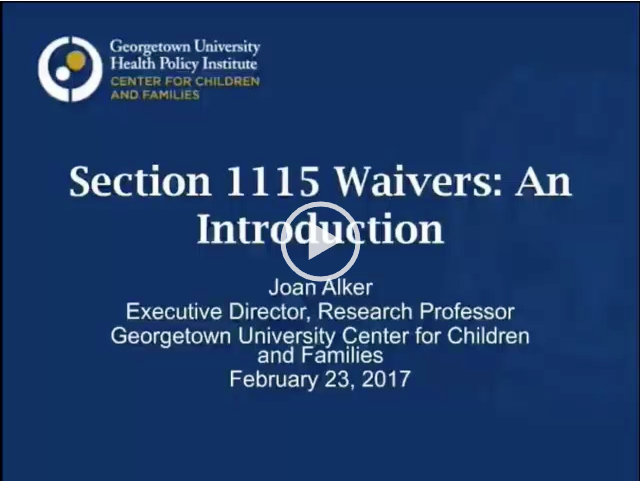Presentations
-
New York State’s First 1,000 Days on Medicaid
In this webinar, participants will learn about the special role NYS Medicaid plays for children and how recent efforts are trying to leverage that to achieve better outcomes across the lifespan. Watch the Recorded Webinar View the Slides
-
Webinar: Developmental Screenings in Medicaid and CHIP: Federal Progress, State Opportunities
Early identification and treatment of developmental delays can help children access the services and supports they need to reach their full potential. Watch an archived webinar on developmental screening for young children and download the full report to learn more.
-
Unpacking the Bipartisan Budget Act of 2018: What are the New Opportunities for Kids’ Health and Prevention?
In this webinar, our presenters discuss CHIP, the Maternal and Infant Early Childhood Home Visiting program (MIECHV), the Family First Prevention Services Act, and key decision points for federal and state lawmakers moving forward. Archived Webinar Slide Decks HEALTHY Kids and ACCESS Acts: CHIP Funding and Other Key Provisions for Child Health The Family First Prevention…
-
The Impact of Alabama’s Proposed Medicaid Work Requirement on Low-Income Families with Children
(Updated August 23, 2018) What is Alabama proposing to do? Alabama is seeking federal permission through a Section 1115 Medicaid demonstration waiver to require parents and caregivers who rely on Medicaid to work 20 to 35 hours a week, prove they are looking or training for a job or do community service before receiving Medicaid.…
-
Archived Webinar: How Can We Tell Whether Medicaid MCOs are Doing a Good Job for Kids?
Medicaid managed care organizations are increasingly responsible for the healthcare provided to 37 million low-income children nationwide. But what do we know about quality of care these plans provide? What can we learn about individual plans? And where can we learn it? Join Georgetown University’s Center for Children and Families for a webinar to explore existing…
-
Child Core Set of Health Care Quality Measures in Medicaid and CHIP
Georgetown CCF’s Tricia Brooks covered the Child Core Set of Health Care Quality Measurement and Reporting, a set of standardized, evidence-based measures to assess the quality of care children receive in Medicaid and CHIP. Below is the webinar, and here is the link for the slide deck.
-
Medicaid and CHIP 101: Medicaid and CHIP’s Foundational Role in Covering Kids and Families
Georgetown CCF’s Tricia Brooks and Kelly Whitener cover the structure of Medicaid and CHIP, including administration, financing, eligibility, benefits, cost-sharing, and how ACA repeal efforts threaten the future of Medicaid. Download a copy of the slide deck below.
-
Resources for Association of Health Care Journalists Conference 2017
Where to Find State-by-State Medicaid Information Federal Government Center for Medicaid and CHIP Services (CMCS) State Medicaid and CHIP Profiles, https://www.medicaid.gov/medicaid/by-state/by-state.html Managed Care State Profiles, https://www.medicaid.gov/medicaid/managed-care/state-profiles/index.html Section 1115 Demonstration Waivers, https://www.medicaid.gov/medicaid/section-1115-demo/demonstration-and-waiver-list/waivers_faceted.html Medicaid and CHIP Payment and Access Commission (MACPAC) MACStats: Medicaid and CHIP Data Book (December 2016), https://www.macpac.gov/macstats/ Data Book: Beneficiaries Dually Eligible for Medicare…
-
Back to the Basics: Medicaid and CHIP 101
Medicaid and CHIP are successful programs that have delivered quality care to low-income children and their families. With the policy landscape surrounding Medicaid and CHIP in flux, child health advocates have their work cut out for them when it comes to educating the public about the critical roles Medicaid and CHIP play in covering kids…
-
Testimony for Hearing on “The Flint Water Crisis: Impacts and Lessons Learned”
The following prepared remarks were delivered by Joan Alker on April 13, 2016 before the Subcommittee on Health and Subcommittee on the Environment of the House Committee on Energy and Commerce for the hearing “Flint Water Crisis: Impacts and Lessons Learned.” Her views do not represent those of Georgetown University. My name is Joan Alker, and…
-
Need Help Learning Eligibility Rules and Application Process for Families with Immigrants?
With less than two weeks left until the end of Open Enrollment two, assisters are racing to get everyone covered, including families with immigrants, often among the most difficult cases. I recently had a chance to help train more than 800 consumer assisters about how to overcome barriers to eligibility and enrollment for health coverage programs…
-
Overview of Immigrant Eligibility Policies for Health Insurance Affordability Programs
The Georgetown University’s Center for Children and Families, in partnership with the Center on Budget and Policy Priorities, and the National Immigration Law Center Presented in a Series of Assister Webinars Focusing on Coverage Eligibility and Application Process for Families that Include Immigrants sponsored by the Centers for Medicare and Medicaid Services. Webinar 1: September…
-
A First Look at Uninsured Rate for Children Since Major Affordable Care Act Provisions Took Effect
Georgetown University CCF researchers teamed up with researchers at the Urban Institute to take a first look at how the Affordable Care Act is impacting the uninsured rate for children. The high level data indicate that, so far, there has been no detectable change nationally, although children’s uninsured rates remained at historically low levels. The…
-
Navigating the Application Process for Families that Include Immigrants
Immigrant resources from a webinar for assisters, February 21, 2014, sponsored by HHS in partnership with CCF, the National Immigration Law Center, and the Center on Budget and Policy Priorities:
-
MACPAC Testimony
Testimony by Tricia Brooks of Georgetown University Center for Children and Families before the Medicaid and CHIP Payment and Access Commission (November, 2013) In 1997, CHIP emerged from the ashes of the prior attempt at health reform. At the time, 5 million uninsured children were eligible but not enrolled in Medicaid, and despite the previous…
-
Health Insurance for Immigrant Families
The webinar examines changes in health reform law and regulations that affect the eligibility of immigrants and the access barriers they face, particularly when part of mixed-status families. It also looks at which rules have not changed, showing a snapshot of the landscape of coverage options for immigrant families as of 2013. Download the recording
-
CCF Presentation: How to Access American Community Survey Data
By Tara Mancini This presentation includes a short tutorial on how to use the Census Bureau’s American Fact Finder website to retrieve summary data on health insurance from the American Community Survey. ACS Webinar









